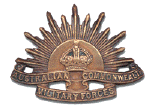 |
| Category: RAN WW2/Hobart |

|
|
|
|
|
|
THREE GALLANT MEN
Found amongst the effects
of 'Wombat' - Frank Sutton - who was serving aboard Hobart during the
Berbera evacuation. He recorded events and feelings for the ship's
Newsletter. Note: The Hobart gunners were not killed.
Months later all three were released unscathed when an Italian POW camp was
captured. |
WAR AND HOW
!
-
In September Nineteen Thirty Nine,
-
At first the worst was Home Defence,
-
The Fleet in calling distance;
-
But "U boats" getting more intense
-
Called for our assistance.
-
The Sydney Heads we left behind,
-
And swung off to the north.
-
Some enemy ships we hope to find
-
The Hobart sallied forth.
-
At Darwin we spent half a day,
-
The ship's a breeding ground for mumps,
-
Singapore we never saw,
-
Accompanied by "Birmingham"
-
We patrolled Sumatra's' coast.
-
Our plane met with disaster
-
And shattered all our boasts.
-
On returning to the airport,
-
As escort to the "Eagle",
-
Colombo's Rickshaw army
-
After several days of leave
-
We1d only been at sea a day
-
Soon the location found,
-
But not a distressed ship.
-
The helmsman turned the ship around
-
And continued with the trip.
-
We reached Bombay on Saturday,
-
We found this city of Bombay
-
An ideal place for leisure.
-
With modern customs of today
-
And houses built for pleasure.
-
The beat idea that did appear
-
A taxi to Beach Candy
-
The shops they did a roaring trade
-
We lay in harbour for a week
-
But our return was not to stay
-
The S.S.Akbar was the ship,
-
Indian troops her freight.
-
As far as Aden was the trip,
-
Four thousand tons her weight.
-
From dawn of day til sun did set
-
We gave her our protection.
-
A ship the Germans didn't get
-
To add to their collection.
-
And when with them we had to part,
-
Those India-n Soldiers fine.
-
They cheered us with an open heart,
-
As our band played "Auld Lang Syne".
-
We cruised about the sea that night
-
Just steaming round and round.
-
Next day the "Ettrick" came in sight
-
And we were Bombay bound.
-
Again in port to stay the night
-
At church our prayers were sent
-
For the man whose life had ceased.
-
His time on earth now spent
-
May he rest his soul in peace.
-
Now "Shifty" was our barber
-
A hearty chap was he
-
A seaman Petty-Officer
-
A worthy man at sea.
-
It was Sunday we were well at sea
-
With ships that numbered ten
-
Steaming Aden bound were we
-
With a crew of homesick men.
-
The fifth day of our Aden run,
-
Abreast of her the Captain roared
-
"Man where's your common sense,
-
To cover up that gun aboard;
-
Your one line of defence.
-
The convoy we were due to leave
-
The fifteenth of December fell
-
After five days steaming steady
-
Yes! all-night leave was granted
-
Two days harbour then to sea,
-
Christmas day on the ocean wave,
-
With duck of the Navy pattern,
-
Unstrained ale they freely gave
-
And duff to make us fatten.
-
With cruiser "Suffren" of proud France
-
So to Colombo we returned
-
Our oil fuel fairly spent.
-
There tied up to the buoy
-
Was the heavy cruiser "Kent".
-
Two days in with leave ashore
-
Where kegs of beer were dripping,
-
Then out again to do some more
-
For unprotected shipping.
-
Nineteen-thirty-nine went by
-
The New-Year took its place.
-
The ringing bells did not apply
-
Nor spliced we the old main brace.
-
The aircraft carrier "Glorious"
-
Her planes all roaring round.
-
An impression so victorious
-
The fleet-Air-Arm renowned.
-
With Cape of Guardafuiai near
-
After four long days and nights
-
Of tiresome weary watches.
-
We saw Colombo's lights again
-
And beer and whiskey scotches.
-
Taxi tours and picture shows,
-
Swimming baths and dances.
-
The dives and dens a sailor sees
-
In any place that chances.
-
The money soon was almost spent,
-
Eastward to Malacca straits
-
To shadow ships of commerce
-
That carry war material freights
-
The Merchant-Navy's premise.
-
Working in the tropics,
-
Three days on the watery waste
-
Then a week of harbour free.
-
With provisions and oil replaced
-
We sailed.... for
Trincom-alee
-
In Trinco there did once belong
-
Our stay was brief but long enough
-
The "Empress of Japan",
-
The "Empress of Canada"
-
"Sobieski", Rangitata"
-
With "Dunera" in the story.
-
Like the relic of a crater
-
Was the "Athos" in her glory.
-
Steaming in formation,
-
With convoy heavy-laden.
-
Red Sea our destination
-
Refuelling ship at Aden.
-
Battleship "Ramillies" together
-
Colombo after twenty days
-
Of scran to make us heave.
-
And then the old Commander says
-
"Forty-eight hours of leave".
-
You'll find it's true in what they say
-
Our next trip found us due south-east
-
Returning at a crawling speed
-
When ship had fuelled at China Bay
-
The journey went without even
-
So to sea to see the sea
-
Four minesweepers strung astern
-
Colombo March the twenty third
Anonymous (anyone know the author?), but preserved by Syd
Clark who also made sailor's uniforms on board HMAS Hobart with his sewing
machine, as well as checked & taught use of amphibian's radio gearů
|
|

